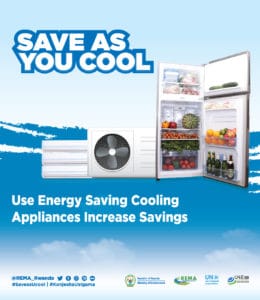
The campaign, in partnership with the United Nations Environment Programme’s United for Efficiency team, is part of the Rwanda Cooling Initiative (R-COOL). R-COOL developed, and is now implementing, a National Cooling Strategy (NCS) on how to cost effectively switch to sustainable cooling solutions that are consistent with the country’s sustainable development ambitions and its obligations in the Kigali Amendment to the Montreal Protocol and the Paris Climate Agreement.
Juliet Kabera, Director-General of REMA put an emphasis on the role of development partners and the private sector in the process of phasing out potent greenhouse gases, hydrofluorocarbons, as well as cooling products that consume excessive amounts of electricity. R-COOL is providing pathways that make it easier and more affordable to buy the latest technologies that have a much lighter impact on the planet.
“Enhancing thermal comfort and refrigerated conditions for food and medicines are critical for the health, well-being, and economic development of the country,” Kabera says.
“Owning a refrigerator that helps you keep your groceries fresh and pay little for electricity means killing two birds with one stone. That also applies for air conditioners. In that sense, before buying a brand-new cooling item, check its energy consumption and whether it is free of hydrofluorocarbons (HFCs) gases to make sure you also contribute to the protection of environment.” She adds.
The multi-month campaign targets users of air conditioners and refrigerators from different settings including homes, offices, grocery stores, bars, hotels, supermarkets among others that can realize significant benefits from more energy-saving and eco-friendly cooling.
The awareness campaign complements R-COOL’s existing Coolease and on-bill financing mechanisms developed with the Basel Agency for Sustainable Energy (BASE) to make efficient and climate-friendly refrigerators and air conditioners more affordable. Rwanda’s National Cooling Strategy recommends such financial solutions and other approaches to transform the market, including energy efficiency standards and product labels for cooling appliances that are coming into effect this year, as well as the establishment of the African Centre of Excellence for Sustainable Cooling and Cold-chain.
R-COOL is made possible by funding from Kigali Cooling Efficiency Program and in-kind contributions from Rwanda Environment Management Authority.
For more information, contact:
Souhir Hammami
Energy Efficiency Specialist | UNEP-U4E
souhir.hammami@un.org